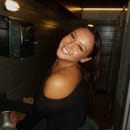“You’re pretty for a Black girl.”
It was the summer going into the fourth grade that I had first received this “compliment,” one that would remain ever-present in my life. This was one of the first days that made me feel truly uncomfortable in my own skin—one of the days that played into the deep-rooted internalized racism that I am still working on unlearning.
My mother always told me that she felt inexplicably incomplete before I was born. She once travelled to Amsterdam, and as she escaped the wrath of her abusive boyfriend, she stumbled upon a café. Through the window, she watched as another young woman ate with her daughter, nestled cozily in her lap. At that moment, my mother knew that her own daughter was missing from her life. Years later, she became the mother of a biracial baby. She herself is white, her skin paler and hair straighter than mine. The concept of race was not her predominant concern. Her mind preoccupied with joy until the criticisms from racist peers and family members came flowing in. When I was two years old, we sat in a park in a predominantly white neighbourhood as another white woman approached us with an urgent demand to have an explanation as to why I did not resemble my mother. She began an unsolicited, comprehensive cross-examination of my family in which she established our biological relationship. Part of her questioning entailed a demand to know why I had curly hair, even asking if it was permed. My mother nonchalantly told the inquisitive mind that I was half Black. Without hesitation, the woman asked, “which half?”, to which my mother jokingly responded, “obviously the top half.” This experience was much more than an innocent outing to the park, it was the beginning of my conscious racial identity.

As a little girl, I always knew that I didn’t look like the rest of my family. I also knew that I didn’t look like any Disney princesses or most of the women I saw on my TV screen. The saying “You must see it to become it” might sound overused, but it perfectly captured my personal experience.
While icons did, of course, exist, there was only really a handful of them with whom I could connect. Not to mention, I never knew if I could even associate with my Black heritage as I grew up in a white family and community. My mother didn’t yet know how to speak the anti-racist language, so Brandy as Cinderella was known as curly-haired Cinderella, when Black Cinderella would have spoken much louder. Besides, my first language was Russian and my mother didn’t know how to translate the anti-racist, Black beauty affirming language. Because I never really understood why I struggled with understanding the beauty of my skin, it absolutely plagued me knowing that I did not look like the norm. My skin served as a continuous reminder that I was perceived as inferior—I was afraid that everyone around me would notice my skin before they saw me. It’s only in recent years that I have finally started understanding that my skin is what makes me who I am.
I remember looking in the mirror the first time I had ever straightened my hair and thinking, even at the age of 9, that I looked like the most beautiful version of myself. As I grew older, my mother begged me not to straighten my hair, but at that point I had lost any and all love I ever had for my 3c curls. Going to school and receiving more compliments than ever became a feeling I yearned to replicate, time and time again. Soon after, I started bleaching my hair, wanting nothing more than to look like the Barbie dolls my mother never wanted me to play with as a child. My looks became completely consuming as I did everything in my power to look as white as I could.
In recent years, I’ve watched my beautiful younger sister struggle with the same exact feeling. I’ve watched as my Black girlfriends spent days and nights crying over relationships, wondering if something could have played out differently had they been a white woman instead, comparing themselves to undeniably unrealistic and damaging images. I often find myself analyzing the behaviour of my partners and thinking that maybe, I would be more desired if not for my brown skin; maybe I could be loved if I was just white. Unfortunately, this mindset exists for women of colour everywhere. It is one that can feel impossible to outgrow.
With all of this in the past and the occasional present, I have to say how important it has become to hear and truly feel the phrase “Black is beautiful.” In a world where harmful stereotypes and prejudices persist, it is a powerful affirmation that serves as a reminder of the resilience and strength within the Black community. It is a declaration that inspires a sense of pride and self-worth, helping us counteract the negative narratives and societal pressures that have sought to undermine our identity. “Black is beautiful” is not just a phrase; it’s a mantra that encourages us to celebrate our heritage, embrace our diversity, and stand tall in the face of adversity. In the end, that first “compliment” was the catalyst for a transformative journey, one that led from self-doubt to self-love as I learned to celebrate the beauty of Black womanhood.



